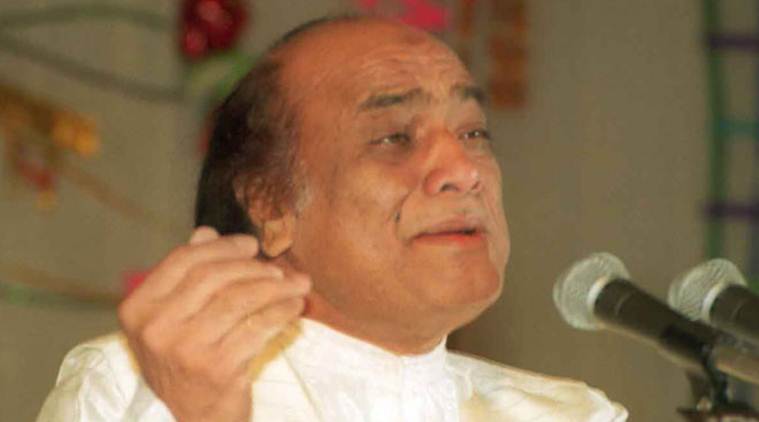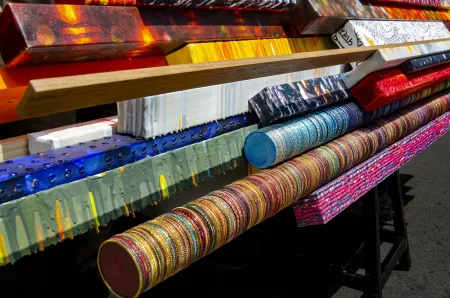- India
- International
When I met ghazal maestro Mehdi Hassan
The Pakistani ghazal singer Mehdi Hassan who passed away in 2012 would have turned 92 today.
 July 18 is the legendary singer Mehdi Hassan’s birthday. (Source: File Photo)
July 18 is the legendary singer Mehdi Hassan’s birthday. (Source: File Photo)
Written by Sumit Paul
I often preen myself on being able to listen to the very best in music directly from the greatest instrumentalists or vocalists — whether it was the redoubtable Yehudi Menuhin playing his Stradivarius violin in New York, or the great Mehdi Hassan enthralling his countless admirers in all parts of the world. I got to listen to the latter’s ghazals in live concerts in Pakistani cities where I taught and spent a considerable period of my life.
While in Pakistan in 2007, I got a call from Pakistani Urdu announcer, the legendary Yawar Abbas from BBC, London, Urdu Service. Aap Mehdi Hassan sahab se roobaroo hona chahenge? (would you like to meet Mehdi Hassan sahab?) Yaqeenan (of course), I said.
He arranged my meeting with the maestro and mailed me his address and contact number. Mehdi Hassan was in Rawalpindi at that time and was working on an album of ghazals with the poet Ahmad Faraz. A day before the scheduled interview, I called him up. An amazing baritone wafted through the phone to enter my consciousness. “Ji, aap Mehdi Hassan se mukhatib hain” (Yes. You’re speaking with Mehdi Hassan). I’ve heard many colloquial and musical voices in my life and have been smitten by the tonal quality of those otherworldly voices. But this was a different voice which reminded me of a line — Meri aawaaz ka teer, jaayega dil ko bhi cheer — from Mohammad Rafi’s song Sun le tu dil ki sada from film Tere Ghar Ke Saamne (1963). It was indeed a divinely resonant voice that left behind the echoes long after the spoken words faded into the ether.
I went to his place at the stipulated time. He was wearing lungi and kurta and had just finished his riyaaz. I’ve never been a star-struck columnist or interviewer, but to see him in flesh and blood was an experience that still gives me goosebumps. Nowadays, interviewers send the questionnaire to the person they wish to interview in advance and there’s a rigmarole of formalities that I’ve seen and fretted about.

But here was a man with no airs, no idea of questions to be asked and no haughtiness, generally associated with such greats. He himself suggested that he would sing a ghazal as a warm-up to the interview. Kaunsi ghazal samaad farmayenge? (Which ghazal would you like to listen to? ), he asked me. Jo aapko sabse zyada pasand ho (Which you like the most). Tay kar paana zara mushkil hai, taaham…….. (Though difficult to decide, yet…..)” Rafta-rafta woh meri hasti ka saamaan ho gaye/Pahle jaan, phir jaane-jaan, phir jaan ke mehmaan ho gaye… This was the immortal ghazal he sang to create an atmosphere of ease and cordiality.
An interview of three-four hours followed and many a facet of his persona transpired. He wondered how I could speak Urdu even better than a native speaker. I told him that my mother tongue was Persian. He was surprised and then began to recite Persian ghazals written by Rahmat Ibtari, Sanai and Khaqani. He told me that he didn’t know Persian but could enunciate the words quite comfortably as Urdu is a blend of Persian and Arabic words. I explained to him many Persian ghazals in Urdu. It wasn’t a structured interview. Rather, it was an informal conversation — betakalluf guftagoo in Urdu.
Extremely articulate and succinct, Hassan sahab regaled me with innumerable anecdotes and experiences. He was all praise for Indian singers like Lata Mangeshkar, Rafi and Talat Mahmood among others. Smartphone was yet to come. There was no photographer to accompany me to his place. I wanted to take a photograph of him. And what he replied, quoting Pablo Neruda, stayed with me: “The pictures engraved on the heart and mind are pictures far vivid and livelier than those in print.” And then he added for good measure- Meri tasveer leke kya karoge/kho doge jab rooth jaaoge (What’ll you do with my picture?/You’ll misplace it when you’ll be angry with me).
Not many know that Hassan was a supremely gifted cook in addition to being a ghazalgo (a ghazal-singer). A vegetarian himself, he loved to serve vegetarian delicacies to his guests. He considered singing as ibadat or bandagi (worship). He once tellingly said: Meri ibadat mein qatl ke liye koi jagah nahin (there’s no place for bloodshed in my worship). Rajasthani urad ki daal was Mehdi’s forte and he loved to have his favourite daal with chapati and gur (jaggery). He was a frugal eater. Simple to the core and a gentleman to a fault, the legend served me gur ki roti when I interviewed him.
Since monsoon has arrived in India, and when I interviewed him it was also the monsoon season, he sang: Baarish ke dino(n) mein kuchh zyada hi yaad aate hain/ Falak pe abra unki zulfon ki yaad dilate hain (I remember her even more during rains/ The clouds on the firmament remind me of her tresses). We also remember Mehdi Hassan all the more in this season as his birthday falls in the middle of the monsoon. He would have turned 92 on July 18, had he been with us.
Sumit Paul is an advanced research scholar of Semitic languages, civilisations and religions.
Apr 25: Latest News
- 01
- 02
- 03
- 04
- 05



































